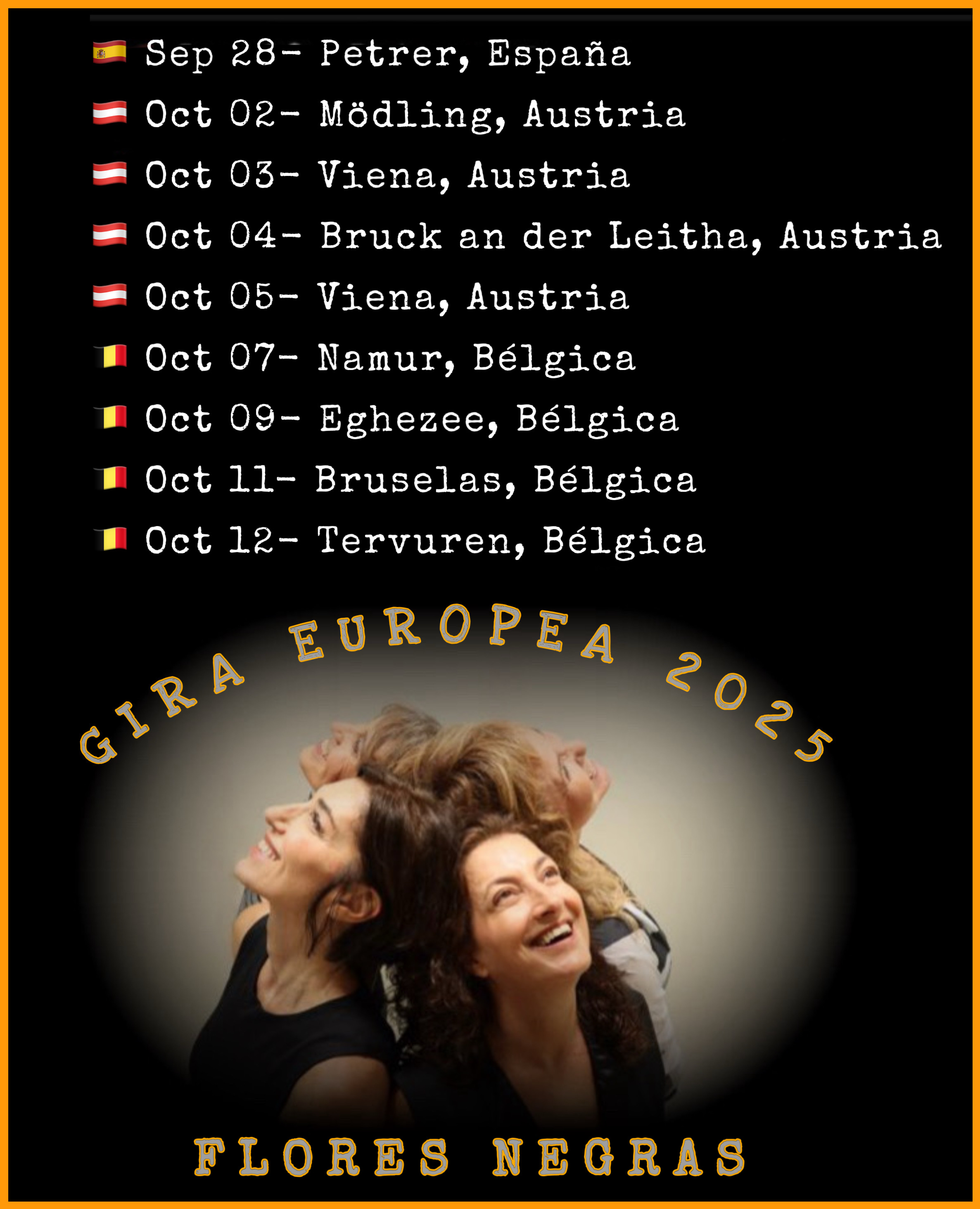
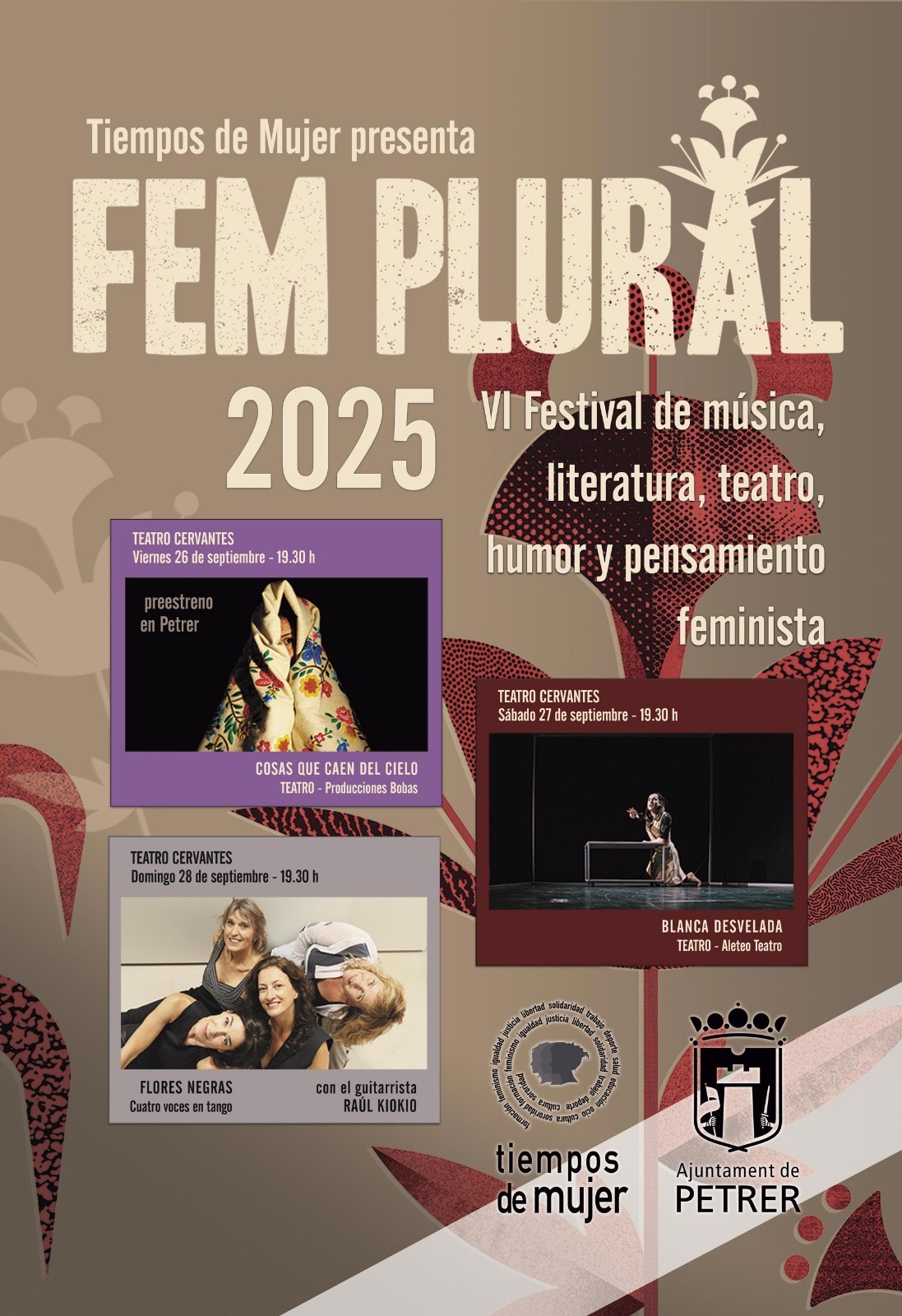

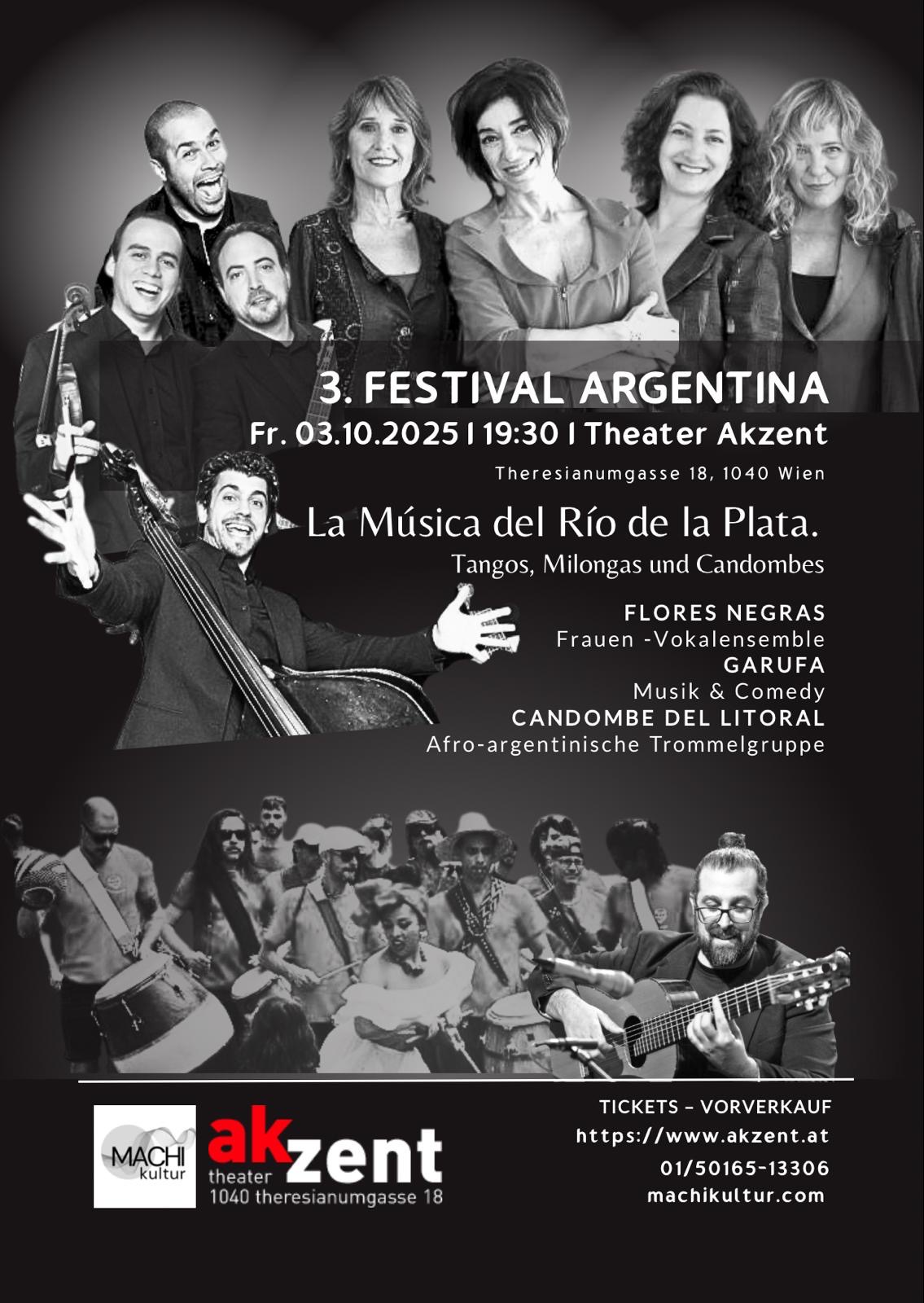
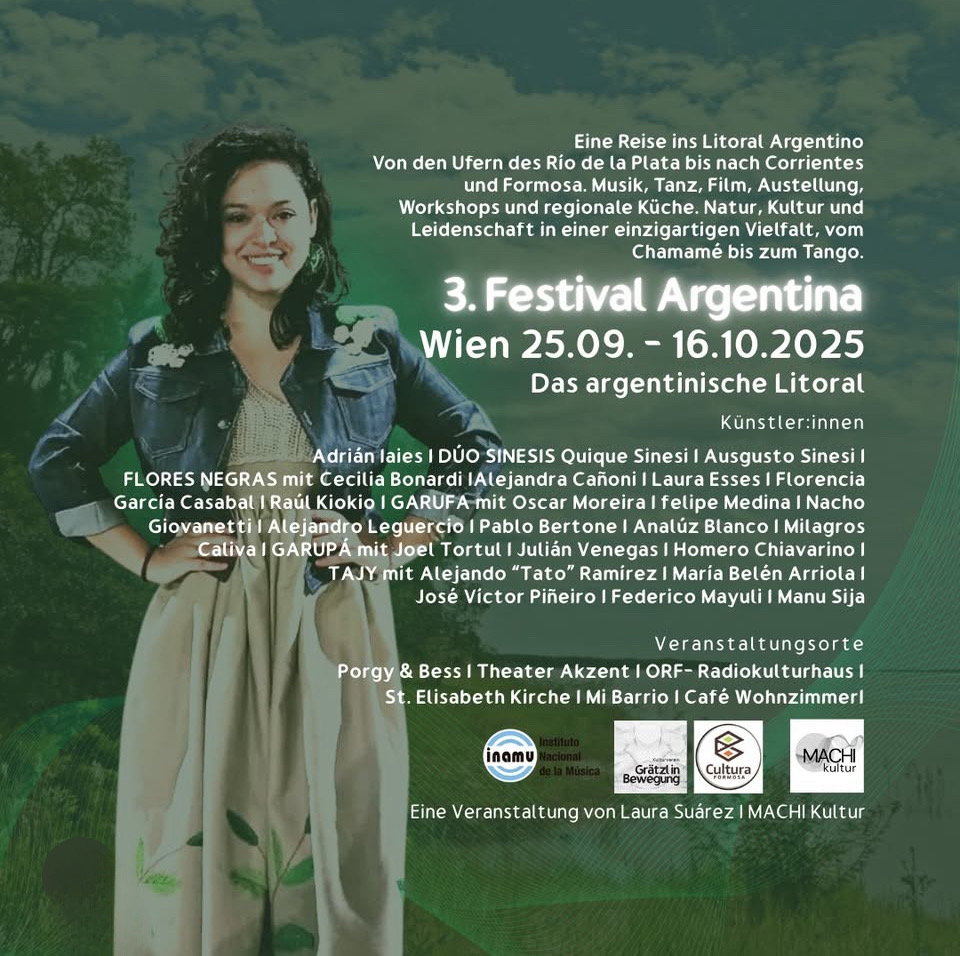
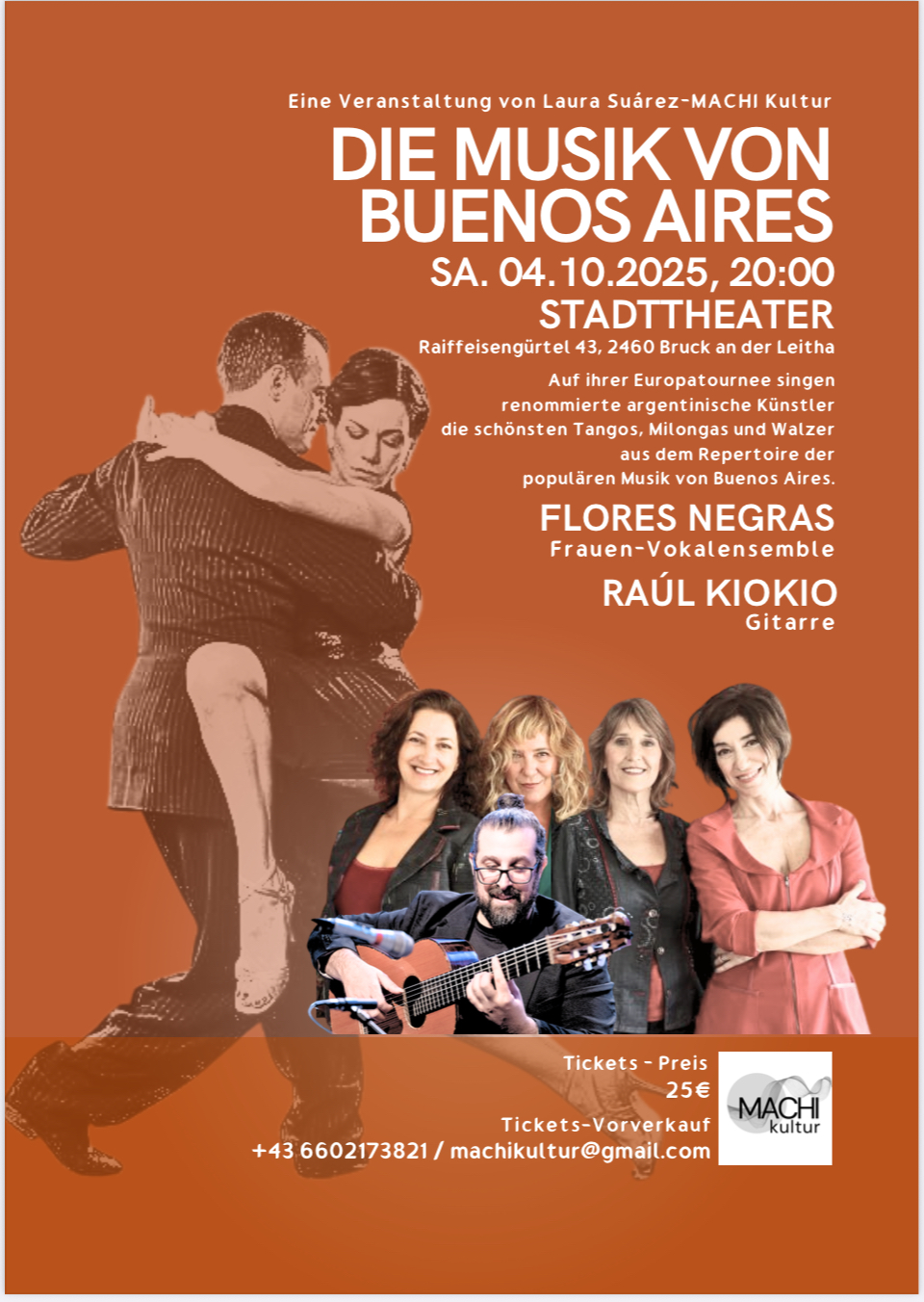
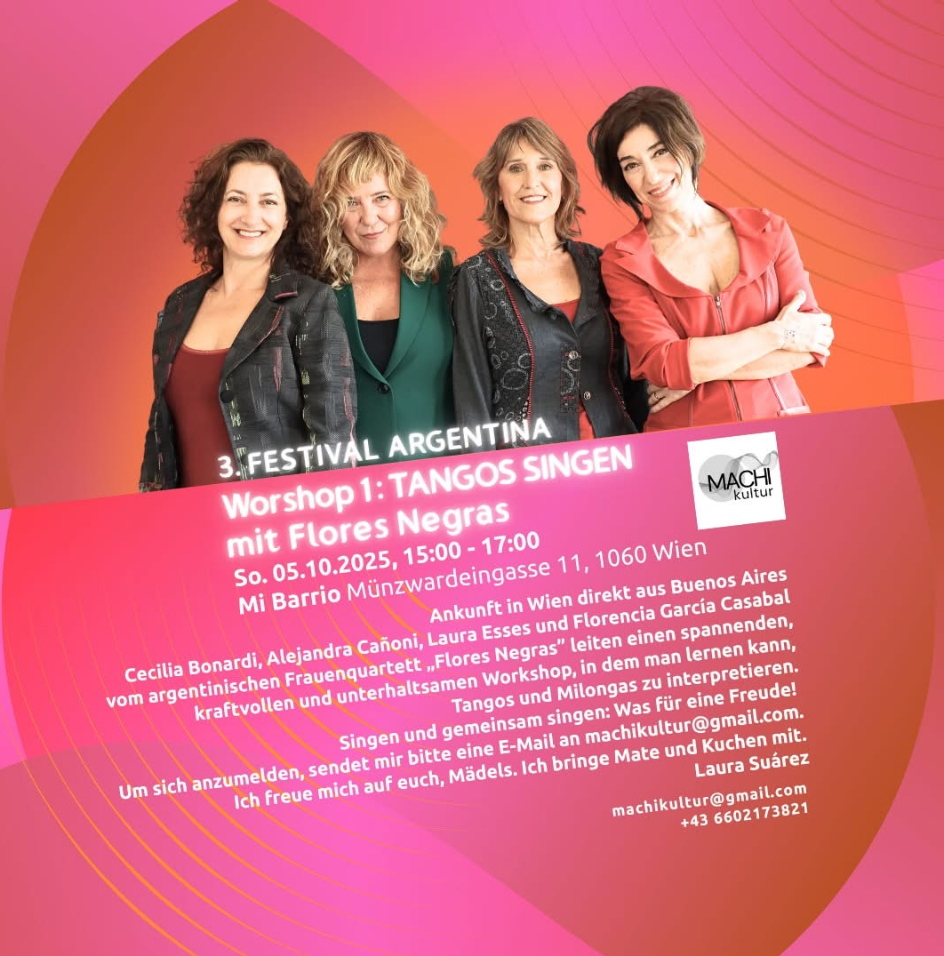
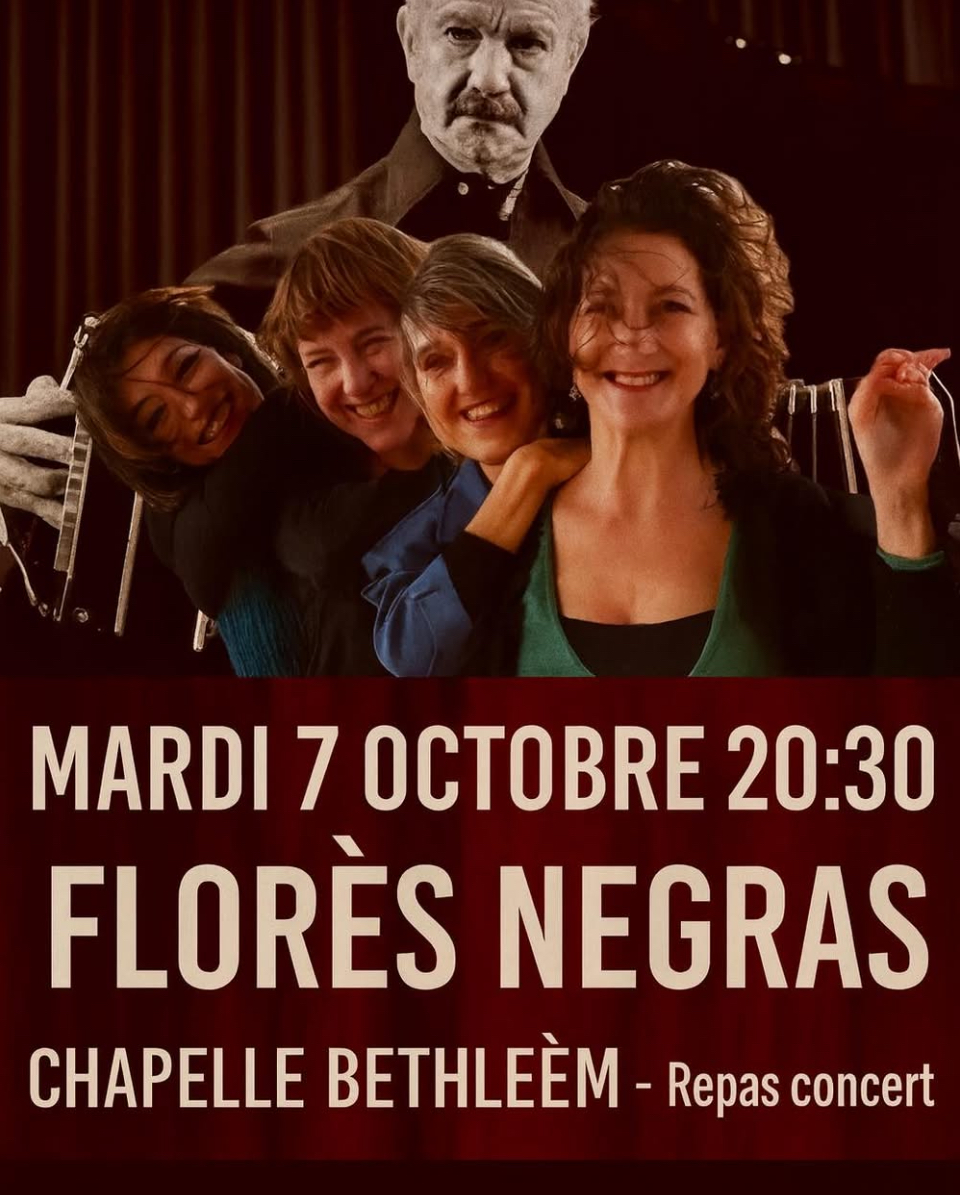
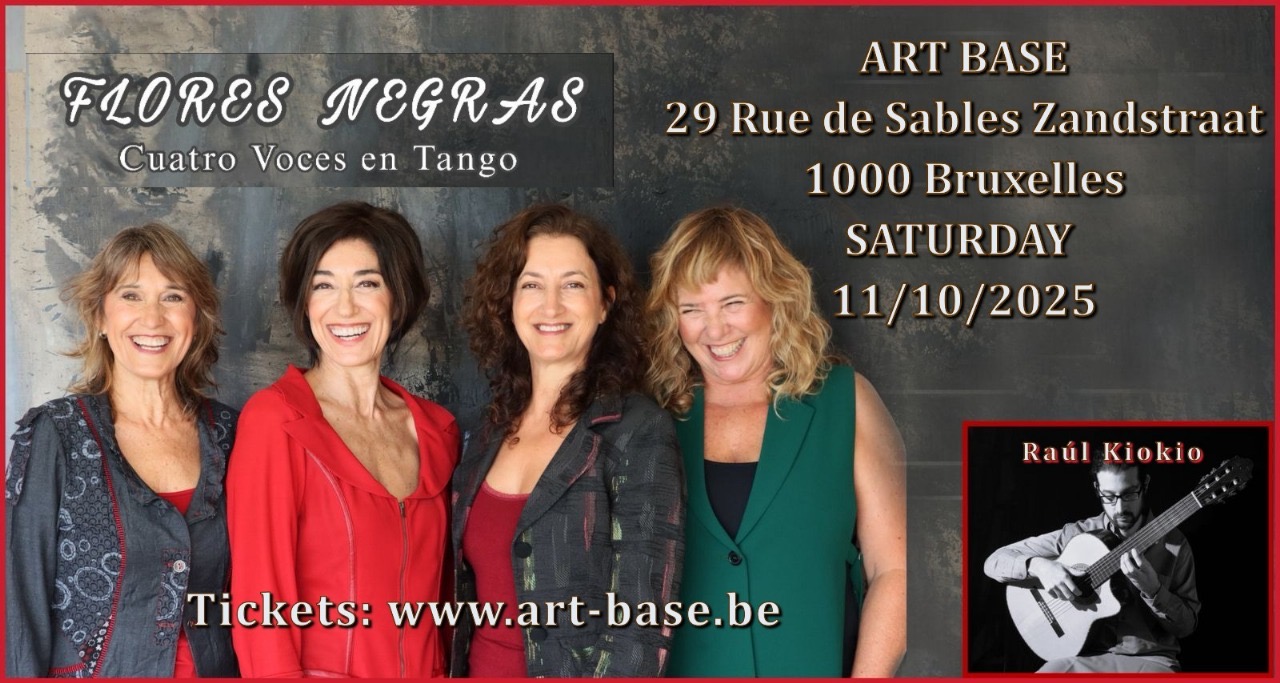
They are also planning a new show, "Afortunadas en el juego", for the first trimester of 2026.
"La Negadora" on Spotify

"La Negadora" on YouTube
"Balada para un Loco" on Spotify

"Balada para un Loco" on Youtube
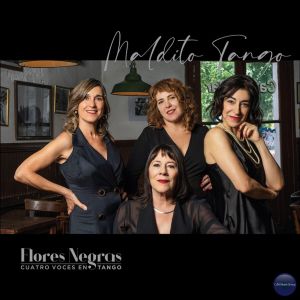
Find it here:👇
Maldito Tango on Spotify
In 1996, these four women decided to call themselves Flores Negras, a name inspired by Francisco De Caro's tango. In this way, they opened a seldom walked road as far as intervening voices in tango repertoire.
They began developing their proposal in several stages in Buenos Aires and the rest of the country, while also carrying their sound to Uruguay, Portugal, Spain, the Netherlands, France, Belgium and Germany in their international journey, performing a wide variety of tangos, waltzes, milongas and candombes.
Cecilia Bonardi, Laura Esses, Alejandra Cañoni and Florencia García Casabal, with arrangements by Oscar Laiguera, Diego Vila, Manu Navarro,Mario Esteban and Javier Zentner, recreate a wide repertoire which ranges from the most classical pieces in the genre to the most current urban music, which they distribute between group pieces, duets and vocal solos.
Symbolic figures in traditional tango, such as Ben Molar and Horacio Ferrer, had only words of praise for the group. In the same vein, Maestro Rubén Juarez honored them by artistically sponsoring them in 1999.
In 2021, for the 100th anniversary of Astor Piazzolla's birth, their video for "Libertango" was selected by the Argentinian Chancellor's office, and spread throughout Argentinian embassies around the world.
Libertango video

Born in Buenos Aires in a family in which music was the highlight among the ordinary, she found her place in piano and singing. Theater came later, a captivating environment that, to this day, continues to help her self exploration. She was in choirs in her school times. In the beginning of her professional singing days, she was part of the vocal group Pirámide (1981/87), in which she performed a jazz-rock repertoire and played in pubs that, at the time, were all over the city. They were invited by Lerner to the concert "Todo a pulmón" at Estadio Obras. With her own group, Pulso Ciudadano (2008-18), she found her musical and poetic language. Her records "Pulso Ciudadano", "Matisses" and "Juglaría porteña" were released, and she performed in renowned stages and festivals both in her country and abroad (Spain, Finland, Germany and Uruguay). But it was Flores Negras, in 1996, that left a footprint for her as a singer by defining her switch to rioplatense music. For her fellow group mates, she is Ceciya (as well as several other nicknames that she prefers -jokingly- not to share). Since 2009, she's been a jury of the Gardel Awards. In June 2025, she will premiere "Los Besos y La Ausencia", a unipersonal musical theater project, written by herself and with Diego Vila in musical direction, Alice Penn in staging, and Nicodemo Tucci in set design.

Born in the city of choir singing, La Plata, she's been surrounded by singing voices since she was a child. Musically, she trained by singing alongside her family and in choirs up until adolescence. Music therapy, Psychomotricity and vocal coaching marked her professional path, articulating art, education and health, areas that she currently researches and transmits. Surrounded by great masters of literature, music and theater, she managed to capture her poetic and creative outlook in her own songs, by releasing her first record, "Constitución", in 2009. Her life journey made her settle in the Ciudad Autónoma de Buenos Aires, and, ever since, she's found herself in the urban rioplatense chords, rhythms and melodies. Alongside Oscar Laiguera, she founded Flores Negras in 1996, and, since then, she's walked along her group mates through the paths of this vocal quartet.

Born in Buenos Aires in 1966, she's a true Porteña and native to the sensitive neighbourhood of Flores, she started in music as soon as she started walking. In her youth, having started to study in the Conservatory and besides maestro N. Zafodd, she was led to one of the most essential experiences in her musical life: the National Youth Choir, in which she went down an extensive scenery of Argentina's geography, and where she also grasped the accuracy and excellence of the expression. Along with the choir "Cántico a Capella" -in charge of maestro Eduardo García Novelli- she was part of the film "La peste" directed by Luis Puenzo. She sang jazz; played four characters through Argentinian Sign Language in a version of "Dracula" for a deaf and hearing audience; played Devorah in "Compasión Devoradora, Trío Juglaresco Alternativo"; created, selected the repertoire and starred in "La Trastornada", written and directed by Ariel Gurevich at Teatro de La Comedia de La Plata, CC25 de Mayo, CC Ricardo Rojas, Fundación Sagai, etc. In 1996, she joined Flores Negras, where she's been catalogued from day one as "the grave one". We still don't fully know what they mean by this. Currently, she is creating and recording, along with Diego Vila, a new music-theater project, mostly composed and written by both of them.

Porteña in her soul, but with part of her heart in "La Feliz", she made it to adulthood with an ideal balance: feet in the ground and wings spread free. Always nurtured by her love of music. That's how she lives, spreading in her different careers, which are her passions: singer and interpreter of Argentinian and Latinamerican popular music, speech therapist, National music teacher, and vocal coach for scenic artists. Her wings lit the city of Buenos Aires, guiding her to stages in all of South America. She performed with the National Orchestra of Popular Music "Juan de Dios Filiberto", and with the Orchestra of Popular Music of the University of Buenos Aires. She has shared stages with great people, such as Oscar Cardozo Ocampo, Jairo, Teresa Parodi, Eladia Blázquez, Horacio Molina, Julia Zenko, Chango Farías Gómez, César Angeleri, Cristian Zárate, Pablo Agri, and many more. She recorded several record productions: "De Amores y Lunas" —presented at the International Tango Festival of Granada, Spain, in 2018—, "De a uno y de a dos", along with her father, Galo García. Both productions arranged and directed by Cristian Zárate and Cesar Angeleri. "Cuando pase el aguacero", as part of the poetic-musical show streamed and recorded during the pandemic, "Florencia García Tango", and two singles in collaboration with Luciana Corral: "Tonada para dos tristezas" and "Coplas a la luna llena". In 2023, Flores Negras, Cuatro Voces en Tango renewed their formation, and she joins as a first soprano. A flower is born. Late in 2024, she presented her fourth solo record, “Hasta Volverme Brote”.

Part of the theater show "Sureño: Concierto en Construcción", along with Alejandro
Viola. During 2023 and 2024, he accompanied singer Karina Beorlegui in the guitar.
Stood out as a guitaronist in Aguafuerte Tango Trio (that he has been part of since 2021) with whom he released “Crónicas guitarreras” (2023).
In the urban music field, he is part of trio 3 Orillas, where he combines the electric guitar, bass and voice, and with whom, in 2022, he won the “Discos Cardinales” contest, organized by the Government of the City of Buenos Aires.
Part of La Runfla, a tango quartet, with whom he participated in a European tour, and also collaborated as an arranger. They played in Paris, Brussels, Amsterdam, Berlin and Hamburg (2022).
As part of trio Bonviván, he participated in two records: “Ironía Sudaca” (2019) and “Bailás?” (2020), a production that had the support of the “Becas de fomento a la creación” program, by the INAMU (National Institute of Music).
He participated in El motín, a tango quartet (guitar, guitarrón, bandoneón and voice), and collaborated in the recording of their EP (2009).
He has been a guitarist and musical director for the shows “De amores y cantares” (nominated for the Hugo awards in 2019) and “Cuatro Barrios” (nominated for best Music Hall show in 2017).
With the Guitar Quintet of EMPA, he participated in the record of the same name in 2017, and with the Koufati/Larisgoitia duet, he participated in the recording of “Espectros de Arrabal”.
In 2025, he joins Cuarteto vocal Flores Negras, Cuatro Voces en Tango as a guitarist.
With Constanza Vieito, Ricardo Astrada, Raúl Kiokio, Héctor Cartechini, Luisa Carmona and Domingo Acevedo at the 35th International Tango Festival in Granada, Spain 2023
With Constanza Vieito and Ricardo Astrada at the 35th International Tango Festival in Granada, Spain 2023
You can write to us at floresnegrastango@gmail.com
or find us in our social networks